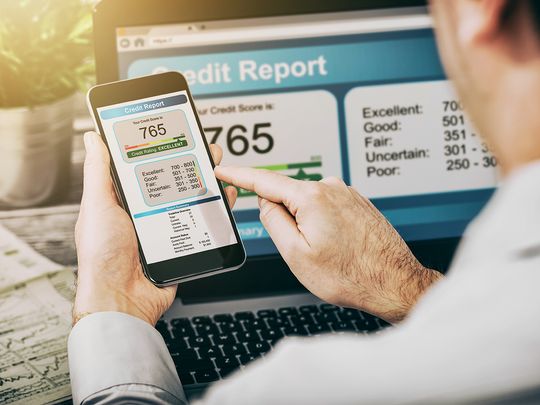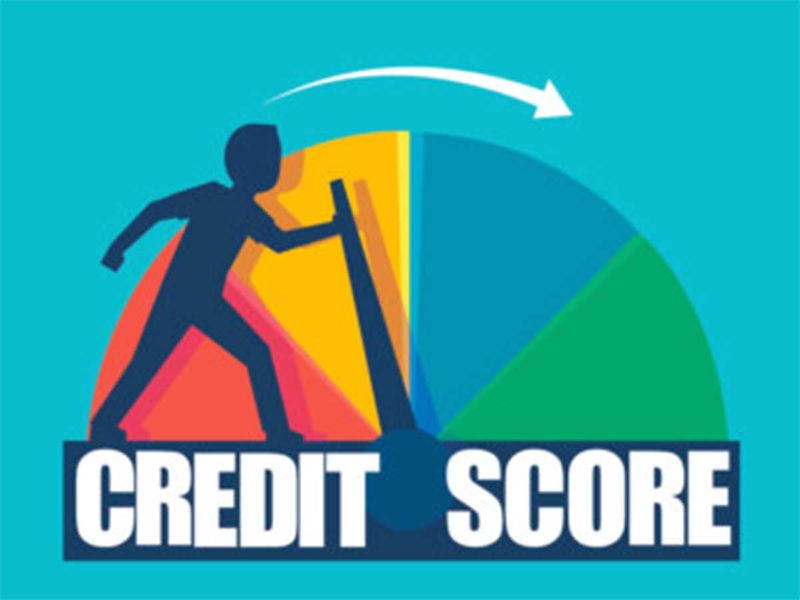
Dubai: If you've worked hard to maintain a good credit score, it can be upsetting to see it drop, especially if your score drops as soon as you fully pay off any loan, when logic dictates that it should rise. UAE-based bankers explain why it happens.
“Credit scores are calculated using a specific formula and indicate how likely you are to pay back a loan on time. But while paying off debt is a good thing, it may lower your credit score,” explained Parthiv Patnaik, a Dubai-based banker with nearly four decades in the industry.
“You see your credit score drop even after fulfilling your payment obligations on a loan or credit card debt because removing the debt often puts your credit mix or your credit utilisation ratio out of balance, or even reduces the length or age of your credit history.”
Patnaik also noted that it's possible the drop in your credit score had nothing to do with closing your debt account or paying off your debts at all. “This is why you have to check your credit score to see if anything else has changed,” he added.
“Maybe you accidentally made a late payment on a different account, or a new credit inquiry caused a slight drop in your score. An error on your credit reports may also harm your score. It’s important to regularly check your credit reports for inaccuracies.”
Your ‘credit utilisation ratio’, generally expressed as a percentage, represents the amount of revolving credit you're using divided by the total credit available to you. A revolving account offers the borrower a steady source of credit that can be used for purchases and paid back multiple times.
Length or age of credit history refers to the age of the accounts that appear in your credit reports. Credit scoring models use various credit age-related metrics when calculating your score, including the average age of your accounts, and the age of your oldest account.
What is a good length of credit history? While there's no such thing as the perfect ‘age of credit’, a study reveals that for people with 800-plus credit scores, their average age of credit accounts was 128 months (a little over 10.5 years).
So if your credit score has dropped as soon as you have paid of a credit card balance in full or the remainder of your loan dues in a single instalment, here are some likely reasons why this has happened in your case:
Reason #1: Your ‘credit utilisation ratio’ has likely risen up
The percentage of credit you use versus the total credit available to you, i.e. your credit utilisation ratio, would have likely gone up for your credit score to be impacted in any way. Here are a couple of scenarios to understand how this works.
Scenario #1: Let’s say you carry forward Dh3,000 in credit card debt across Dh10,000 total available credit, your credit utilisation ratio is 30 per cent, which is the expert-recommended threshold. What you should know is that credit utilisation, or amounts owed, make up 30 per cent of your score.
“Only revolving lines of credit, like credit cards, factor into your credit score, while instalment loans, like personal loans, do not,” explained Jose Paul, an Abu Dhabi-based banking analyst. But how does paying off a credit card could impact your credit utilisation ratio.

Scenario #2: Imagine you have two credit cards with Dh5,000 credit limits. One card has a Dh4,000 balance, and the other has a Dh1,000 balance. In this case your credit utilisation rate is 50 per cent (Dh5,000 divided by Dh10,000).
If you pay off the Dh1,000 debt and close the card, your credit card debt to credit availability ratio would jump to 80 per cent (Dh4,000 divided by Dh5,000). So, even though you paid down some of your debt, this shift in credit utilisation could cause your score to drop.
One way, Paul suggested, to avoid this would be to pay off the Dh1,000 debt and keep the account open. That would leave you with a zero balance and a Dh5,000 limit, lowering your credit utilisation to 40 per cent across both accounts.
Reason #2: Your average credit account age has likely decreased
“Since the average age or length of your credit history makes up 15 per cent of your credit score, closing one of your oldest accounts can bring down this average and hurt your score,” Patnaik added.
“This is another reason why you should keep accounts open when you can, even if you’re not using them and they have a zero balance. Keeping your oldest credit card open, for example, as long as it has no annual fee, can help keep your credit account age up, and as a result, your credit score.”
As credit scores also consider how many types of credit you have and provide more favourable scores to people with a good mix of credit accounts, if your credit score has dropped soon after you paid off a loan, it may also indicate that you now have fewer types of credit or debt-related accounts.
“While you don’t need too many types of credit account, you’ll score better if you have a mix of revolving accounts, like credit cards, line of credit or an account refinancing your home loan, and installment accounts, like an education loan, auto loan or mortgage,” said Paul.
“If you close an account that changes your credit mix, it could hurt your score. For example, if you only have credit cards and a personal loan and pay off your personal loan, you’re down to a single type of credit.
Bottom line?
While paying off your debts often helps improve your credit scores, this isn’t always the case. It’s possible that you could see your credit scores drop after fulfilling your payment obligations on a loan or credit card debt.
However, Patnaik and Paul both reaffirmed that any such drop doesn’t mean you should ignore what you owe. The benefits of paying your debts are far greater than the drop that you may see in your credit scores, and the negative impact is likely to be temporary.











